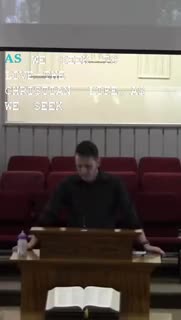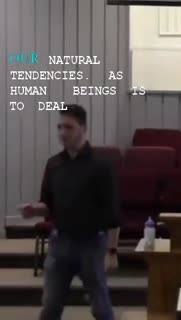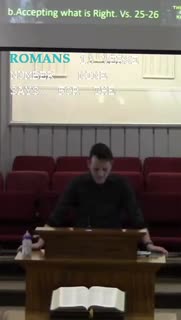Transforming Hearts: The True Meaning of Righteousness
Devotional
Sermon Summary
Bible Study Guide
Sermon Clips
1) "As we seek to live the Christian life, as we seek to live out what Jesus is saying right here in the sermon on the Mount, as he calls us to understand the root motivation behind murder, what anger leads us to, we have to recognize our need for the Holy Spirit. We have to recognize our need to follow the Holy Spirit that indwells. Those who have trusted in Jesus Christ. Our big idea this morning is murder, anger, and hatred are issues of the heart. You may say, well, that is not very groundbreaking. It doesn't need to be. We have a hard enough time with it as it is." [06:12] (47 seconds)
2) "Our natural tendencies as human beings is to deal with the outward and ignore the inward. That's our natural tendency. That's what the Pharisees were doing. That's what the, the, the Sadducees, that's what the, that's what the scribes and the lawyers were doing is they were living a very outward faith with nothing inside that was changed. And so Jesus isn't saying that he is revoking thou shalt not murder. What he's doing is he is giving them a proper understanding of what he is saying." [08:21] (37 seconds)
3) "The way we treat others, the way we view others, the way we speak to them and about them demonstrate whether we ourselves have truly understood what it means to love and what it means to be loved by God himself. Because it says we love him because he first loved us. And if we don't demonstrate that love to others, he says that we have not experienced the love of God. So this does not make me feel good today. God's word is not meant to make us feel good. God's word is meant to show us who we are and why we have need of him and what he has done." [36:21] (60 seconds)
4) "We forget what Christ has saved us from. We forget that those who are without Christ are blinded by Satan. We need to get over ourselves and how smart and great we think we are. And we need to recognize that I need Christ just as much as everyone I encounter needs Christ. And my call is not to insult and demean and attack and think I'm greater than. My call is to share the gospel and the love of Christ with those that I encounter. Because he alone can change people." [38:02] (32 seconds)
5) "Romans 13 verse number nine says, for the commandments, you shall not commit adultery, you shall not murder, you shall not steal, you shall not covet, and any other commandment are summed up in this word, you shall love your neighbor as yourself. Do you love your neighbor as yourself? Murder, anger, hatred, these are all issues of the heart. What do your actions, what do your words demonstrate about your heart today? What do your words, what do your actions demonstrate about your heart this last week?" [39:47] (35 seconds)
Ask a question about this sermon
2) "Our natural tendencies as human beings is to deal with the outward and ignore the inward. That's our natural tendency. That's what the Pharisees were doing. That's what the, the, the Sadducees, that's what the, that's what the scribes and the lawyers were doing is they were living a very outward faith with nothing inside that was changed. And so Jesus isn't saying that he is revoking thou shalt not murder. What he's doing is he is giving them a proper understanding of what he is saying." [08:21] (37 seconds)
3) "The way we treat others, the way we view others, the way we speak to them and about them demonstrate whether we ourselves have truly understood what it means to love and what it means to be loved by God himself. Because it says we love him because he first loved us. And if we don't demonstrate that love to others, he says that we have not experienced the love of God. So this does not make me feel good today. God's word is not meant to make us feel good. God's word is meant to show us who we are and why we have need of him and what he has done." [36:21] (60 seconds)
4) "We forget what Christ has saved us from. We forget that those who are without Christ are blinded by Satan. We need to get over ourselves and how smart and great we think we are. And we need to recognize that I need Christ just as much as everyone I encounter needs Christ. And my call is not to insult and demean and attack and think I'm greater than. My call is to share the gospel and the love of Christ with those that I encounter. Because he alone can change people." [38:02] (32 seconds)
5) "Romans 13 verse number nine says, for the commandments, you shall not commit adultery, you shall not murder, you shall not steal, you shall not covet, and any other commandment are summed up in this word, you shall love your neighbor as yourself. Do you love your neighbor as yourself? Murder, anger, hatred, these are all issues of the heart. What do your actions, what do your words demonstrate about your heart today? What do your words, what do your actions demonstrate about your heart this last week?" [39:47] (35 seconds)





